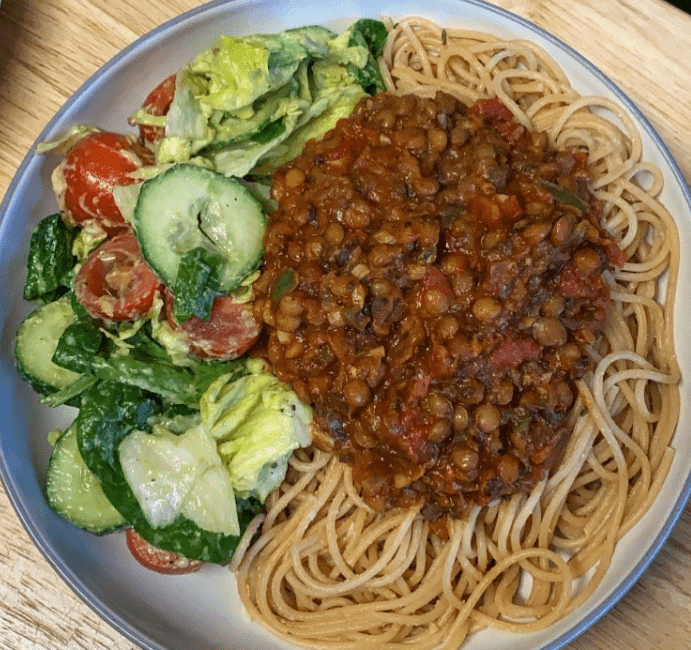Plant-Based Diet Food List: Don’t instinctively assume that a “plant-based diet” is limited, dull, or tasteless the next time you hear the term. With all of the options available, a plant-based diet is simple to follow, and you may enjoy Healthier versions of foods you usually eat. For example, a great plant-based supper can be made with pesto pasta or bean enchiladas made with potatoes, sweet potatoes, healthy grains, and legumes.

Specific recipes for plant-based meals can be found on websites such as www.nutritionstudies.org, www.eatingwell.com/category/4243/special-diets/, or the Ireland Army Health Clinic nutrition experts. To follow a plant-based diet, all you have to do is eat more veggies and less meat. To put it another way, eat more fruits, veggies, legumes, whole grains, and nuts/seeds while eating less meat and processed foods. You can eat whatever you want on this diet and don’t have to worry about calories or macronutrients like protein or carbs.
“There is a fallacy out there that you will be protein deficient if you are on a plant-based diet,” Angela Gerrity, a licensed dietician at the Ireland Army Health Clinic at Fort Knox, Kentucky, said. “If you’re not getting enough calories on a plant-based diet, you’re not getting enough protein. Some people concentrate on macronutrients and worry about going hungry if they choose a vegetarian or vegan diet, but they don’t consider how many nutrients are lacking from the manufactured foods they consume every day.”
If you keep track of how much food you’re eating, you can make eating less enjoyable. You can mix and match foods like whole fruits (not juice), vegetables, whole grains, nuts, and seeds to get the most nutrition out of your meal if you’re seeking a diversity of nutrients.
Health Benefits Does a Plant-Based Diet Provide
In the United States, poor eating habits are the largest predictor of early death. (9) A diet high in saturated and trans fats, as well as salt and processed meats, is harmful to health and lifespan in the United States, whereas a diet rich in whole foods and plant-based nutrients appears to be advantageous. As the following studies show, eating a plant-based diet can reduce your risk of medication use, obesity, high blood pressure, and even type 2 diabetes and heart disease. Even seemingly little aspects, such as looking for locally sourced or organically farmed foods, should not be a source of concern.
This is especially true if your diet for the previous several weeks was comprised primarily of fast food. To get the most out of your diet, you should eat more whole plant foods and less meat, dairy products, and eggs. As a result, your overall health as well as the nutritional makeup of your meals will improve. She recommends starting with little steps in making a change, such as limiting meat consumption to one day a week at first. “You can progressively increase the number of days you eat no animal products to two or three times a week after a few weeks. A plant-based diet is a better choice when you’re attempting to save money.”

We tend to loosen our diets a little when we go out to eat or travel. However, if you complete your schoolwork ahead of time, you will be able to avoid becoming hungry. If you’re heading out to dinner with friends at the last minute, do some research online or phone ahead to make sure the restaurant has vegan options. As a result of increased demand, certain menu selections are now more generally offered. A plant-based diet has been demonstrated to lower blood pressure, lower cancer risk, and lower Type 2 Diabetes risk. Vegans had a lower risk of heart disease and cancer than non-vegetarians who cut their red meat consumption, according to the Adventist Health Study-2.
Any New Proof That Eating a Plant-Based Diet Is Beneficial
The majority of persons who adhere to this diet are motivated by the prospect of improved health. “This way of eating has been linked to many heart advantages,” Manaker continues. According to some studies, a plant-based diet has been associated with enhanced fertility and a lower risk of developing type 2 diabetes. Research published in Frontiers in Public Health in July of this year backs up her claim. In a study published in the Journal of the American College of Cardiology in July 2017, a diet rich in plant-based foods such as nuts, whole grains, fruits, vegetables, and oils was linked to a lower risk of heart disease.
The epidemics of Type 2 Diabetes and obesity in this country are affecting our population’s overall health. Plant-based diets are also low in calories and fat, so they’re great for losing weight. According to Gerrity, those who eat a plant-based diet will need fewer drugs and doctor visits in the future. According to an article in “Scientific American,” plant-based diets are also good for the environment. According to the studies, the average American’s beef consumption produces as much greenhouse gas as driving a car for 1,800 miles. “Eat a Plant-Based Diet,” HuffPost, Nov. 4, 2013. Bartolotto, “Eat a Plant-Based Diet,” HuffPost, Nov. 4, 2013. (HuffPost).
According to a study published in the Journal of Geriatric Cardiology in May 2017, eating a plant-based diet can help prevent and manage type 2 diabetes, as well as lower the risk of other chronic illnesses including cancer. (4) Furthermore, a study published in BMJ Open Diabetes Research & Care in October 2018 indicated that people with type 2 diabetes who ate a plant-based diet had better mental and physical well-being, as well as a higher quality of life and overall health.
In conclusion, what does it mean to eat a plant-based Diet?
According to an analysis published in the journal Nutrients in December 2019, eating a plant-based diet may reduce the risk of heart disease and maybe cancer in African Americans. Individuals whose diets contained the most plant-based protein had a 6% reduced risk of premature mortality than those who consumed less protein overall, according to an analysis of research (including more than 715,000 participants) published in July 2020 in the British Medical Journal. A high-plant-protein diet was linked to a lower risk of premature death from any cause, according to one study.
Researchers discovered a link between increased fruit, vegetable, and legume intake and a lower risk of all-cause early death in a study of more than 135,000 people, with participants reaping maximum health benefits at three to four servings per day—an amount that anyone on a plant-based diet is likely to meet. Of the different forms of plant-based diets, Yule states, “all plant-based diets reduce animal-derived meals in favor of plants.” Fruits and vegetables, rather than meat and dairy products, take center stage in a healthy diet. This nutrient-dense, the flavor-packed diet has several benefits, including weight loss and illness prevention.
Among other things, a plant-based diet can help the environment, your health, and your waistline. Consider it a “lifestyle transformation in progress” rather than a diet. Let’s make some positive changes to our health now that the new year has arrived. Even small changes, like placing more veggies on your dinner plate, can make a big difference. Tonight, instead of steak, we’ll eat beans and vegetables.




